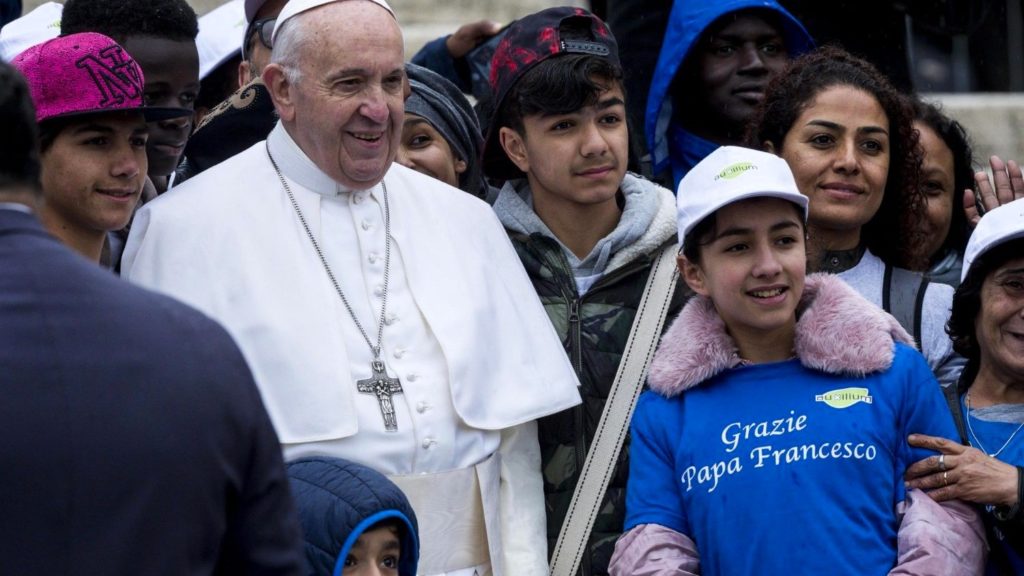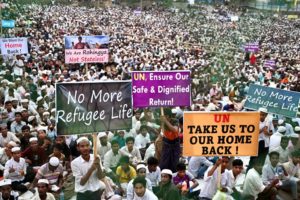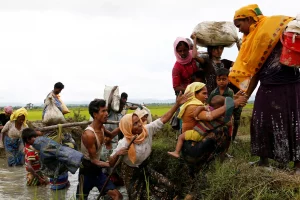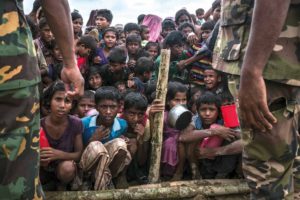
“No one can remain excluded because of his or her place of birth, much less because of privileges enjoyed by others who were born in lands of greater opportunity. The limits and borders of individual states cannot stand in the way of this.”
He had been ill for several weeks and many thought he would die imminently. Pope Francis, however, did what he had done most of his life, he confounded all prognostics – and diagnosis – and lived to deliver the traditional Easter blessing, urbi et orbi, to the faithful assembled, like every year, at St Peter’s Square in the Vatican City. He died the next day.
It was as if Pope Francis clung stubbornly to life until he witnessed the Resurrection before he departed this Earth. As if he thought that the world is safe again, now that Christ is risen.
Across the world media, over the next few weeks, a plethora of obituaries and celebrations of his life will be replete with details about the late pope’s personality and deeds. Among them, his disdain for material things and formality, like refusing first class tickets, paying for himself in economy class, staying in cheap hotels and, once elected pope, how he spurned the Apostolic Palace, choosing, instead, to live in a modest guesthouse within the Vatican City. Beyond this, what more markedly defined Pope Francis, is his taking sides with all those around the globe who thought no one would take their side.
Who Am I To Judge?
More than any speech, one sentence summarised his moral standpoint. Breaking the centuries-old taboo in the Catholic Church about homosexuality, he said “If a person is gay and seeks God and has goodwill, who am I to judge him?” Often abridged to “who am I to judge”, it was a lesson in tolerance, acceptance of the other, freedom of choice, and in recognising the value of all human beings on the basis of what another preacher, Martin Luther King, called the content of one’s character. The statement may have caused division within the Catholic Church, but it brought solace to gay people around the world. It also set the standard for how to treat fellow human beings.
Yet, despite this avowed reluctance to judge, Pope Francis was judgemental. He judged many, especially those with power and wealth, who, he thought, blatantly harmed others. A basic tenet of Christianity, the Commandment “love thy neighbour as thyself” is also recognised by many non-Christians. Yet both Christians and non-Christians often treat it as a mere adage, a proverb for particular social situations. Pope Francis, however, seems to have taken it to heart, and perhaps given it another meaning, “fight those who hate their neighbour”. He seemed to say “how can you pretend to love your neighbour while you are building barriers and walls between you, and slamming your door in their face when they come to you for shelter?
Moved by “People on the Move”
No amount of philosophical debate can demonstrate this more than one of his earlier acts. His first official travel, less than four months after his election in March 2013, was to Lampedusa, the Italian island which was the destination of legions of so-called migrants who crossed the Mediterranean, to seek the proverbial “better life” or, in many cases, simply life. Whether fleeing poverty or escaping repression, they arrived there in droves, leaving behind members of their families and friends, as well as countless dead bodies in the waters of the Mediterranean. It was to honour these dead that Pope Francis threw a wreath of flowers into the sea, while symbolically using a boat as an altar to pray for their souls. A hitherto little known speck in the Mediterranean, Lampedusa became a household name. The migrants in the little Italian island became a cause. As a Guardian writer put it “Francis visited recently arrived migrants on the island of Lampedusa on Monday, lambasting the rich world for its lack of concern for their suffering and inveighing against a “globalisation of indifference”. He did not hold back in his criticism of right wing European governments, whom he held responsible.
Following this early episode, he evolved into a champion of the migrants and displaced. His response to President Trump’s project of a “beautiful wall” on the Mexican border was a sharp comment. People, he said, should not build walls, but bridges. His later condemnation of Trump’s policy of mass deportation of foreign residents, and what he saw as the criminalisation of migrants and all those with an illegal status became a recurring theme. During a visit to another island, Lesbos, in Greece, he described the brutal treatment of refugees by governments as “the Shipwreck of Civilisation”. He emerged as the most vocal critic of anti-migrant policies; indeed he became the voice of the migrants.
He made the environment central to his definition of Catholic theology, on equal terms with social justice and human dignity. He looked at the planet as our home and condemned what he considered inept leaders for ill-treating it. His outspokenness and his castigations attracted disapproval. He was attacked by the ultraconservatives for his liberalism, and by the left for his caution and what was seen as timid action. Many on the right even described him as a Marxist revolutionary, something he later denied.
A Disturbing Force
After the outpouring of grief, will come – it has already started – the torrent of criticism about what he has not achieved, about the frustrated expectations and the unfulfilled promise. This concerns mostly Catholics seeking reform, and observers and critics of the Church. To all others, who did not look to the Pope, any pope, for comfort or protection, what is remarkable is that he did the unexpected. He reached out to those who did not think he was obligated to them.
Few religious leaders earned so much public respect as Pope Francis, with the possible exception, to my non-Catholic, non-Christian, areligious eyes, of the Dalai Lama and the late Archbishop Desmond Tutu. He may have failed in the unspoken promise (to gay people, to women), but it is worth remembering that his kingdom (on Earth) was the Roman Church, not the Roman Empire. “None” would be the answer to the oft-quoted question by Stalin: “how many divisions has the pope?” Which is, perhaps, the reason why he commanded (moral) authority over so many non-Christians. His lambasting of all the evil deeds of governments and power networks, was frequently disturbing, and I have no doubt that many governments often echoed the words of Henry II of England, speaking about Archbishop (and future saint) Thomas Beckett “will no one rid me of this troublesome priest?”
As he travelled around the world, going to countries which no pope before him had visited, including a dozen in Asia and some ten in Africa, he seemed to ignore diplomatic caution, simply addressing problems, mainly those plaguing Frantz Fanon’s “wretched of the earth”, the poor, the vulnerable, the downtrodden. While praying in Seoul for survivors of devastating wild fires and a ferry disaster, he preached for peace and reconciliation in the Korean Peninsula and urged both North and South Korea to engage in dialogue and forgiveness.
After visiting Myanmar, he pronounced the word Rohingya, which everyone else avoided, for fear of offending the government, who did not view the Rohingya as an ethnic group but as foreign migrants. “The presence of God today is also called Rohingya” he said in Dhaka, Bangladesh, making it clear where they, and similar peoples, stood in his faith.
“Commanders of the Faithful” in Council
It is, therefore, not surprising that Francis displayed unequalled fervour about interfaith dialogue, something Vatican News dubbed friendship with other religions. He went out of his way, quite literally, to meet with prominent religious leaders, something he had started as the Archbishop of Buenos Aires, when he and his friend, Rabbi Skorka, held frequent inter-religious talks. A staunch adversary of anti-semitism, he later condemned Israel’s excessive repression of the Palestinians.
He extended his friendship to Muslim leaders like the Grand Imam of Al Azhar, the historic theological university in Cairo, Sheikh Ahmed Al-Tayeb, considered the principal authority on Islamic theology. The Vatican called it a joint commitment to peace, harmony, and opposition to religious extremism. Their collaborative Document on Human Fraternity for World Peace and Living Together “outlines shared values and principles for promoting peace and understanding among people of different religions and cultures”, and the joint signatories “resolutely declare that religions must never incite war, hateful attitudes, hostility and extremism, nor must they incite violence or the shedding of blood”.
The document could be equated to a credo of worldwide inter-religious and intercultural action for peacebuilding. Its claim that “Justice based on mercy is the path to follow in order to achieve a dignified life to which every human being has a right”, can be said to apply to all the situations and crises which the pope has brought to the attention of the world.
Francis famously travelled to the UAE, an unprecedented visit which was differently commented and interpreted, but which, inter alia, contributed to calling attention to Christian and other minorities in the region, and to the immigrant communities whose rights in the Arabian Peninsula are notoriously the object of frequent violations. He highlighted the plight of the “all too many” children who pay a high price in war worldwide, especially in Syria, Yemen and Irak. He also denounced the escalation of violence in Yemen, whose numerous innocent victims are often children. The Gulf States’ own motivations may be regarded with cynicism, but Francis seized the opportunity, it could be said, without judging.
Shouting at the Rich, Whispering to the Poor
The dialogue with Islam continued farther afield in Indonesia, Turkey, Tunisia and Morocco. In North Africa, he continued to speak to migrants and to speak on their behalf. During a discussion, in Tunisia, with survivors of failed crossings, migrants, volunteers and staff of rescue operations, he said to them: “The only instance in which it is legitimate to look down on a person is when one kneels to help them get up”. It is not certain whether this was also heard by the authorities which engage in mass expulsion of migrants. As to the migrants themselves, whatever their physical hardships, their spirit will have received a jolt.
In Morocco where he went as “a pilgrim of peace and fraternity” he held meetings with migrants from West Africa. He spoke vigorously about the “deep wound which continues to tear us apart at the dawn of the 21st century”, and denounced the increase of the number of refugees and mass migration, as well as trafficking and modern slavery. Referring to the fenced up Spanish enclaves of Ceuta and Melilla, the hoped-for destination of many migrants, he reflected that “those who build walls end up being prisoners of the walls they build”. A migrant, he said, is no more, no less human depending on which side of the border he finds himself. It is essential to restore their human dignity which got lost on the way.
In all the ten African countries he visited in his twelve year reign, Francis reconnected with his roots as the pope of the poor and the most vulnerable. In Kenya he attacked new forms of colonialism which exacerbated the dreadful injustice and urban exclusion. Nairobi slum dwellers who felt abandoned by politicians said that by contrast, his visit, even for one hour, made them feel human. During his trip to the DRC, he delivered a resounding condemnation of neo-colonial economic policies. “Stop suffocating Africa” he said. “It is not a mine to be exploited or a land to be plundered.”
He Walked the Earth
Even as he was feeling the pangs of terminal illness, he remained close to the causes he defended, the voiceless to whom he gave a voice. Gaza was central in his thoughts and he telephoned daily to a priest who continued to live there. His very last words, the urbi et orbi blessing, spoke of the people of Gaza, the Palestinian people, the Israeli people, but also mentioned Syria, Lebanon, Yemen. He spoke of Ukraine for which he cried during a prayer at the start of the war, of Myanmar, of Africa, in particular the DRC, Sudan and South Sudan, and the Sahel. Though the text was short, these countries were not crammed in, each individual mention sounded like a full, dedicated, address.
His flock will now be saying “habebamus papam” we HAD a pope. Now that he is gone many will wonder if his successor and all those with power will somehow mirror Francis’ passion and dedication. In three weeks time, their eyes will be on that white plume ascending from the Vatican, and wondering whether there will be renewed hope, or will it all be but smoke and mirrors. Perhaps future migrants trying to cross to Europe and finding themselves in difficulty, will encounter Francis walking on the blue water of the Mediterranean, guiding them out of danger, and concealing them from Frontex and its ruthless accomplices.
About the Author: Salem Mezhoud is the Vice-Chair of United Against Inhumanity. He specialises in human rights, conflict, and humanitarian affairs with a main focus on Africa. He worked for the UN High Commissioner for Human Rights, OCHA, and, as a consultant and contributor, for ILO, UNICEF, UNESCO, as well as several NGOs. He also worked for the European Union security mission in the Sahel. He has held academic positions in France, the USA and lately, King’s College London.
The opinions expressed in this blog are those of the author and do not necessarily represent the views of United Against Inhumanity (UAI).











